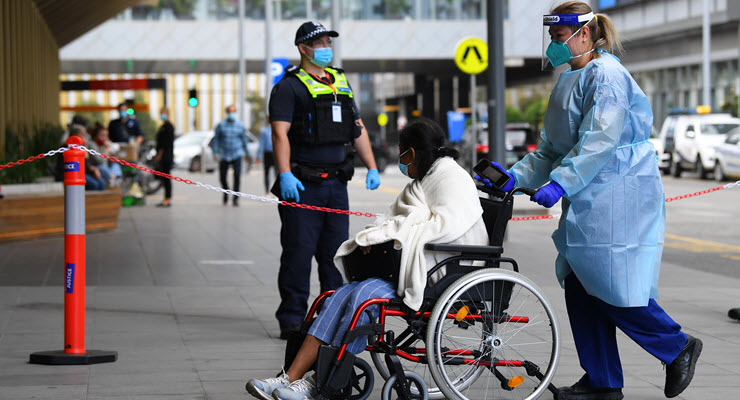
A highly infectious strain of COVID-19 has landed in Australia, detected in returned travellers in NSW, WA, Victoria, and South Australia.
The strain is circulating in the UK, may be up to 70% more infectious than other widespread variants, and has contributed to the decision to put England and Scotland into another lockdown.
Australian leaders think the threat to Australia is so serious that national cabinet will meet tomorrow, weeks ahead of schedule, to consider how to strengthen hotel quarantine.
This morning NSW and Victoria reported no new locally transmitted cases in the past day.
A cause for concern
Victorian deputy chief health officer Professor Allen Cheng tells Crikey that pushing the national cabinet’s meeting forward showed officials were taking the super strain’s threat seriously.
“It reflects the concern there is about the situation overseas and how the systems in place across the country need to be strong,” he said.
Cheng adds that no matter how robust the hotel quarantine system is, there is always a risk the strain could spread to the wider population.
“Every system has humans in it and where there are humans involved there is a risk,” he said. “Our job is to make sure there are enough things in place to minimise these risks.”
The Victorian and WA governments want travellers to Australia to be tested before they board their flights, and Victoria wants all states to follow its lead in testing all international flight crews.
Cheng said states were scrambling to implement findings from Victoria’s COVID-19 hotel quarantine inquiry and the National Review of Hotel Quarantine, both released last year.
This morning WA reported a serious hotel quarantine breach where three health workers failed to wear appropriate personal protective equipment (PPE) while caring for an elderly patient from the UK who’d tested positive. It’s not known whether she has the more infectious strain of the virus, and the three workers are now also in quarantine.
NSW authorities believe Sydney’s Avalon cluster, which pushed the northern beaches of Sydney into lockdown and prompted other states to close their borders to NSW, is linked to a returned US traveller in hotel quarantine.
Should we shut the borders?
While some experts have called for Australia’s borders to be shut entirely, University of Queensland infectious diseases physician Paul Griffin tells Crikey officials need to focus on fixing the current system.
“We need to have a gold standard border control irrespective of the COVID-19 strain,” he said, adding that training the right people to man the hotels was crucial.
“We’re not there yet.”
Griffin also says that speeding up the vaccine rollout shouldn’t be a priority.
“We have a due process for good reason,” he said. “The message needs to be clear that the right processes have been followed.”
Mutant strains a common worry
Walter and Eliza Hall Institute epidemiologist Professor Ivo Mueller tells Crikey more COVID-19 strains are bound to emerge.
“By isolating and treating people, we’re forcing the virus to find other ways to transmit and become more infectious,” Mueller said. “From an evolutionary point of view, it’s not surprising.”
He says that while there is good evidence the UK strain is more infectious, it doesn’t seem to cause more serious disease. He also stressed other factors abroad were causing the virus to spread more quickly.
“We’re seeing a surge in the US and the UK because Christmas was a super spreader event,” he said. “More people were indoors and in contact with one another.”








Crikey is committed to hosting lively discussions. Help us keep the conversation useful, interesting and welcoming. We aim to publish comments quickly in the interest of promoting robust conversation, but we’re a small team and we deploy filters to protect against legal risk. Occasionally your comment may be held up while we review, but we’re working as fast as we can to keep the conversation rolling.
The Crikey comment section is members-only content. Please subscribe to leave a comment.
The Crikey comment section is members-only content. Please login to leave a comment.